Mai multe țări africane în care malaria este răspândită sunt așteptate să aprobe rapid noul medicament în urma deciziei Swissmedic.
Sursa: EuroNews

Mai multe țări africane în care malaria este răspândită sunt așteptate să aprobe rapid noul medicament în urma deciziei Swissmedic.
Sursa: EuroNews
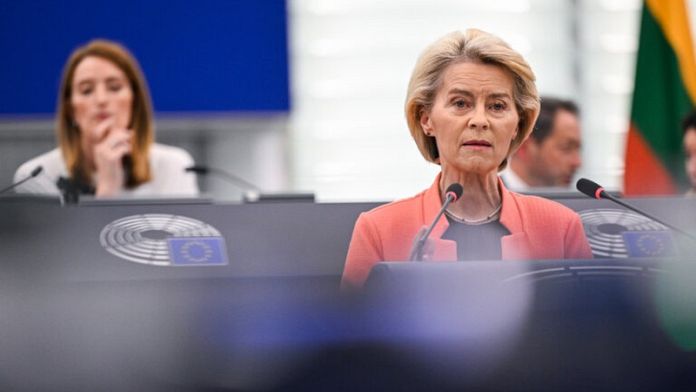
Majoritatea grupurilor politice nu sunt hotărâte să susțină moțiunea de cenzură care ar răsturna Comisia condusă de von der Leyen. Dar ea nu a fost scutită de critici.
Sursa: EuroNews
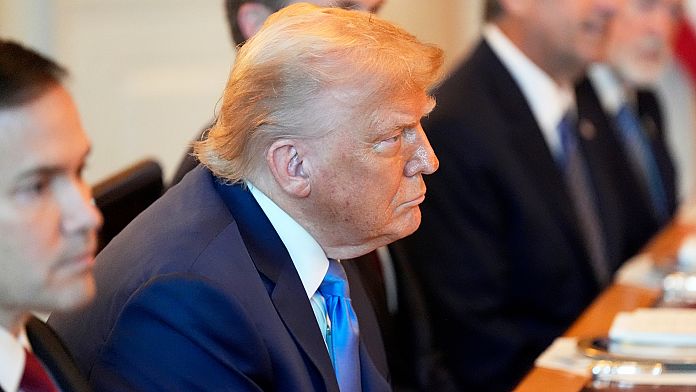
President Donald Trump meets with Israel's Prime Minister Benjamin Netanyahu in the Blue Room of the White House. 7 July 2025. – Copyright AP/Alex Brandon Copyright AP/Alex Brandon By AP with Eleanor Butler
President Donald Trump on Monday announced a 25% tax on goods imported from Japan and South Korea, as well as new tariff rates on a dozen other nations that would go into effect on 1 August.
Trump posted letters on Truth Social that were addressed to the leaders of the various countries. The letters warned them not to retaliate by increasing their own import taxes, or else the Trump administration would further increase tariffs.
“If for any reason you decide to raise your Tariffs, then, whatever the number you choose to raise them by, will be added onto the 25% that we charge,” Trump wrote in the letters to Japanese Prime Minister Shigeru Ishiba and South Korean President Lee Jae Myung.
The letters were not the final word from Trump on tariffs, so much as another episode in a global economic drama in which he has placed himself at the centre.
His moves have raised fears that economic growth will slow to a trickle, if not make the US and other nations more vulnerable to a recession. But Trump is confident that tariffs are necessary to bring back domestic manufacturing and fund the tax cuts he signed into law last Friday.
Despite his threats, the president showed a willingness to negotiate, a tactic that suggests the drama and uncertainty will continue.
“It’s all done,” Trump told reporters Monday. “I told you we’ll make some deals, but for the most part we’re going to send a letter.”
South Korea’s Trade Ministry said early on Tuesday that it would accelerate negotiations with the United States to achieve a mutually beneficial deal before the 25% tax on its exports goes into effect.
Related
Imports from Myanmar and Laos would be taxed at 40%, Cambodia and Thailand at 36%, Serbia and Bangladesh at 35%, Indonesia at 32%, South Africa and Bosnia and Herzegovina at 30% and Kazakhstan, Malaysia and Tunisia at 25%.
Trump placed the word “only” before revealing the rate in his letters to the foreign leaders, implying that he was being generous with his tariffs.
But the letters generally followed a standard format, so much so that the one to Bosnia and Herzegovina initially addressed its leader, Željka Cvijanović, as “Mr. President”, although she is a woman. Trump later posted a corrected letter.
White House press secretary Karoline Leavitt said that Trump, by setting the rates himself, was creating “tailor-made trade plans for each and every country on this planet”.
Following a now well-worn pattern, Trump plans to continue sharing the letters sent to his counterparts on social media and then mailing them the documents, a stark departure from the more formal practices of all his predecessors when negotiating trade agreements.
The letters are not agreed-to settlements but Trump’s own choice on rates, a sign that the closed-door talks with foreign delegations failed to produce satisfactory results for either side.
Wendy Cutler, vice president of the Asia Society Policy Institute who formerly worked in the office of the US Trade Representative, said the tariff hikes on Japan and South Korea were “unfortunate”.
“Both have been close partners on economic security matters and have a lot to offer the United States on priority matters like shipbuilding, semiconductors, critical minerals and energy cooperation,” Cutler said.
Trump still has outstanding differences on trade with the European Union and India, among other trading partners. Tougher talks with China, where exports sent to the US are being taxed at 55%, are more of a long-term prospect.
The office of South African President Cyril Ramaphosa said in a statement that the tariff rates announced by Trump mischaracterised the trade relationship with the US. He said that his country would nonetheless “continue with its diplomatic efforts towards a more balanced and mutually beneficial trade relationship with the United States” after having proposed a trade framework on 20 May.
The S&P 500 stock index was down 0.8% in Monday trading, while the interest charged on 10-year US Treasury notes increased to nearly 4.39%, a figure that could translate into elevated rates for mortgages and auto loans.
Trump has declared an economic emergency to unilaterally impose the taxes, suggesting they are remedies for past trade deficits even though many US consumers have come to value autos, electronics and other goods from Japan and South Korea.
The constitution grants Congress the power to levy tariffs under normal circumstances, though tariffs can also result from executive branch investigations if they are imposed on national security grounds.
Trump’s ability to impose tariffs through an economic emergency is under legal challenge, with the administration appealing a May ruling by the US Court of International Trade that said the president exceeded his authority.
It’s unclear what he gains strategically against China — another stated reason for the tariffs — by challenging two crucial partners in Asia, Japan and South Korea, that could counter China’s economic heft.
“These tariffs may be modified, upward or downward, depending on our relationship with your Country,” Trump wrote in both letters.
Because the new tariff rates go into effect in roughly three weeks, Trump is setting up a period of possibly tempestuous talks among the US and its trade partners to reach new frameworks.
“I don’t see a huge escalation or a walk back — it’s just more of the same,” said Scott Lincicome, a vice president at the Cato Institute, a libertarian think tank.
Related
Trump initially roiled the financial markets by announcing tariff rates on dozens of countries, including 24% on Japan and 25% on South Korea. In order to calm the markets, Trump unveiled a 90-day negotiating period during which goods from most countries were taxed at a baseline 10%. So far, the rates in the letters sent by Trump either match his 2 April tariffs or are generally close to them.
The 90-day negotiating period technically ends Wednesday, even as multiple administration officials suggested the three-week period before implementation is akin to overtime for additional talks that could change the rates. Trump signed an executive order Monday to delay the official tariff increases until 1 August.
Congressionally approved trade agreements historically have sometimes taken years to negotiate because of the complexity.
Administration officials have said Trump is relying on tariff revenues to help offset the tax cuts he signed into law on 4 July, a move that could shift a greater share of the federal tax burden onto the middle class and poor as importers would likely pass along much of the cost of the tariffs. Trump is pressuring major retailers such as Walmart to absorb the higher costs, instead of increasing prices, which could intensify inflation.
Josh Lipsky, chair of international economics at The Atlantic Council, said a three-week delay in imposing the tariffs was unlikely sufficient for meaningful talks to take place.
“I take it as a signal that he is serious about most of these tariffs and it’s not all a negotiating posture,” Lipsky said.
Trump’s team promised 90 deals in 90 days, but his negotiations so far have produced only two trade frameworks.
His outline of a deal with Vietnam was clearly designed to box out China from routing its America-bound goods through that country, by doubling the 20% tariff charged on Vietnamese imports on anything traded transnationally.
The quotas in the signed United Kingdom framework would spare that nation from the higher tariff rates being charged on steel, aluminium and autos, though British goods would generally face a 10% tariff.
The United States ran a s cheapest and most expensive countries
2
In partnership with Cabinet Secretariat3
4
5
Sursa: EuroNews
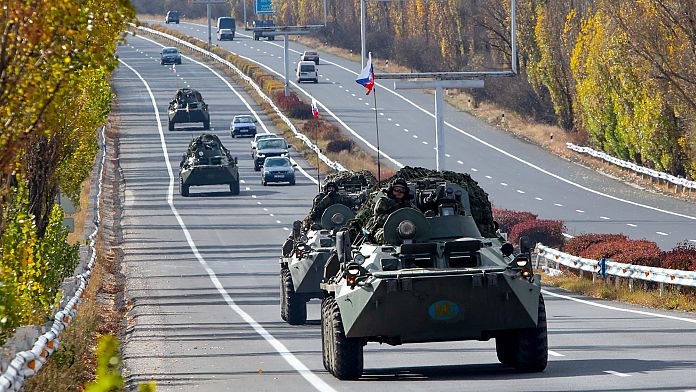
Erevanul a negat afirmațiile inițiale, dar Kievul a publicat ceea ce pretinde a fi un ordin al armatei ruse de a-și spori prezența militară la cea mai mare bază a Rusiei din Armenia, lângă granița cu Turcia.
Sursa: EuroNews
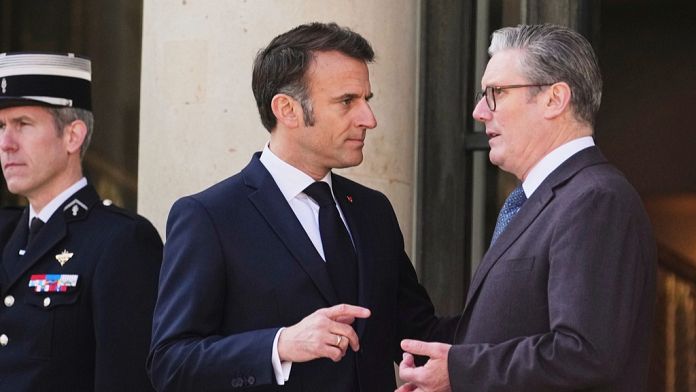
Liderul francez urmează să sosească în Marea Britanie marți pentru o vizită de stat de trei zile, care va combina discuții politice și ceremonii regale.
Sursa: EuroNews
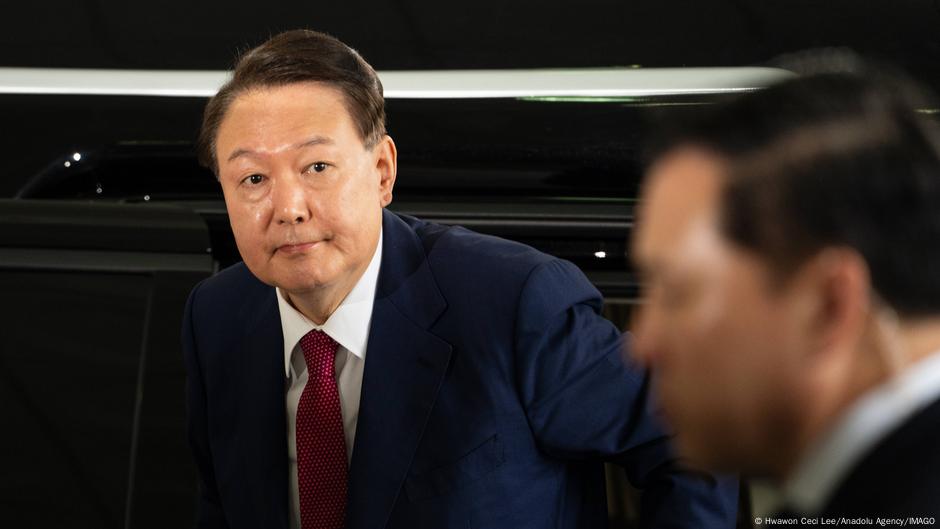
Conform rapoartelor din Coreea de Sud din această săptămână, anchetatorii au obținut înregistrări audio ale comunicării dintre președintele de atunci și armată cu privire la presupusele desfășurări de drone.
Analiștii spun că incursiunile, care ar fi avut loc în octombrie 2024, au fost probabil menite să provoace o reacție din partea Coreei de Nord.
Acest scenariu i-ar fi oferit lui Yoon justificarea de a declara o urgență națională și de a impune legea marțială, lucru pe care l-a și făcut în cele din urmă în decembrie.
Yoon, care a fost ulterior pus sub acuzare, se confruntă acum cu acuzații penale pentru insurecție din cauza declarației sale de scurtă durată a legii marțiale.
Choo Jae-woo, profesor de politică externă la Universitatea Kyung Hee din Seul, a explicat că există „doar două motive” pentru care un președinte poate declara legea marțială, unul dintre acestea fiind „agresiunea externă sau o invazie”.
„Se pare că, după ce a provocat Coreea de Nord, Yoon se aștepta la represalii care…” „pe care l-ar putea folosi apoi pentru a justifica declararea legii marțiale”, a declarat el pentru DW.
„Dar acel plan a dat efectul invers când Nordul nu a răspuns militar”, a spus el. Phenianul a protestat față de incursiuni, dar nu a răspuns militar.
Pentru a viziona acest videoclip, vă rugăm să activați JavaScript și să luați în considerare actualizarea la un browser web care acceptă videoclipuri HTML5
Yoon a declarat legea marțială pe 3 decembrie, spunând că trebuie să protejeze națiunea de forțele „comuniste nord-coreene” și „antistatale”. Nu a furnizat nicio dovadă pentru afirmațiile sale.
Încercarea sa controversată de a folosi armata pentru a prelua controlul asupra guvernului a durat doar câteva ore.
A fost pus sub acuzare și suspendat 10 zile mai târziu, apoi arestat în ianuarie.
Acuzația de insurecție a fostului lider se pedepsește cu închisoare pe viață sau pedeapsa cu moartea, deși Coreea de Sud nu a executat pe nimeni de decenii.
Yoon, care a fost eliberat pe cauțiune în martie, a negat acuzațiile, spunând că „legea marțială nu este o lovitură de stat” și că declarația sa a fost concepută ca un „mesaj pașnic” către națiune pentru a evidenția intențiile opoziției împotriva guvernului.
El a fost interogat din nou la Seul sâmbătă, iar o zi mai târziu, procurorii speciali au depus o cerere pentru un nou mandat de arestare pentru presupus abuz de putere, falsificare de documente oficiale, încălcarea… legea privind securitatea prezidențială și obstrucționarea îndatoririlor oficiale.
Potrivit presei sud-coreene, o audiere pentru confirmarea mandatului de arestare a fost programată pentru miercuri. Se așteaptă ca Yoon să se prezinte personal pentru a-și prezenta argumentele în fața instanței.
Autoritățile spun că acuzațiile de trădare, care includ trimiterea de drone în Coreea de Nord, nu au fost incluse în acuzații, deoarece acestea sunt încă investigate, dar ar putea fi adăugate ulterior.
În octombrie 2024, au existat rapoarte despre drone deasupra capitalei nord-coreene, Phenian, care se află la 210 kilometri (130 de mile) nord de Zona Demilitarizată ce împarte Peninsula Coreeană, în trei ocazii.
Coreea de Nord a publicat presupuse imagini cu drone și a susținut ulterior că a găsit rămășițele unuia dintre vehiculele aeriene fără pilot (UAV) care fuseseră doborâte după ce au aruncat pliante de propagandă.
În Coreea de Sud, Ministerul Apărării a respins rapid afirmațiile Phenianului. Însă ministerul a revenit câteva ore mai târziu, declarând că nu poate confirma sau infirma rapoartele.
Coreea de Nord a amenințat că va efectua atacuri de represalii împotriva Sudului, ca răspuns la pliantele de propagandă pline de „zvonuri incendiare și absurdități”.
Sursa: DW
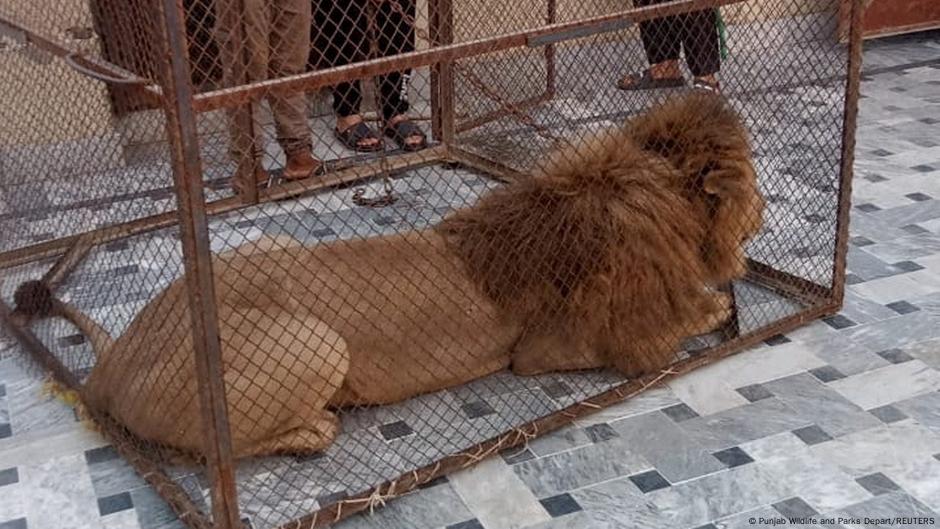
Autoritățile au lansat o acțiune de represiune după ce un leu a evadat dintr-o casă din Lahore, capitala provinciei Punjab, și a atacat o femeie și doi copii. Incidentul, care a avut loc săptămâna trecută, a fost filmat.
Niciuna dintre persoane nu a suferit răni care să-i pună viața în pericol, potrivit oficialilor provinciali. Leul, care era ținut fără licență într-o casă din Lahore, a fost confiscat.
Leul a fost trimis într-un parc safari local, potrivit lui Mubeen Elahi, directorul general al Departamentului provincial pentru Faună Sălbatică și Parcuri.
Poliția a declarat că proprietarul a fost arestat.
Ținerea unui leu acasă fără respectarea cerințelor legale pentru deținerea de feline mari este o infracțiune pedepsită cu până la șapte ani de închisoare, a declarat Elahi agenției de știri Reuters.
Pe lângă confiscarea celor 18 animale, departamentul a efectuat percheziții la 38 de ferme de creștere a leilor și tigrilor și a arestat opt persoane pentru încălcarea regulilor, a spus el.
Citește mai multe știri pe top10stiri.ro
Există peste 500 de lei și tigri în case și ferme de creștere din Punjab, a spus Elahi, adăugând că aceștia vor fi inspectați până la sfârșitul săptămânii.
Deținerea animalelor exotice este considerată un simbol al statutului în rândul unor pakistanezi bogați, în ciuda taxelor mari asociate cu deținerea acestora.
Editat de: Wesley Rahn
Sursa: DW
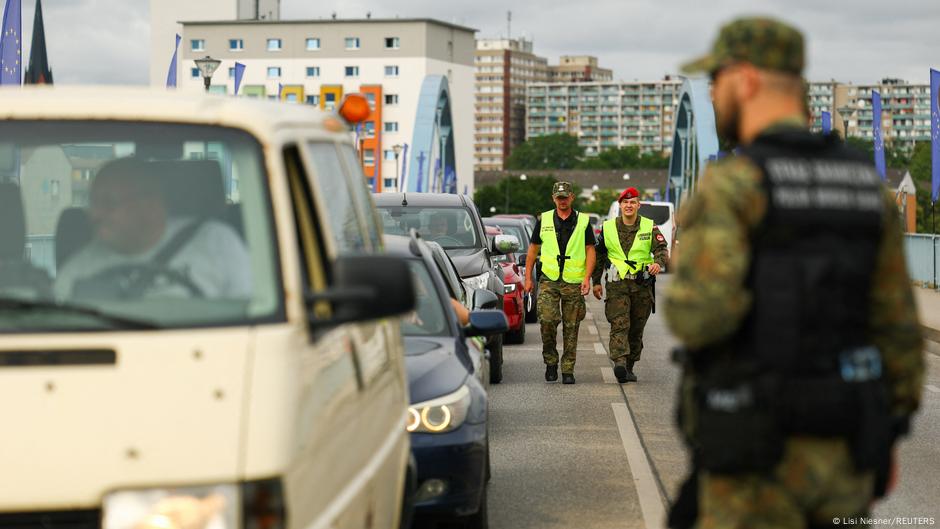
According to Polish Prime Minister Donald Tusk, the controls are temporary and aimed at stopping human trafficking and irregular migration. Yet the move comes just weeks after Germany itself ramped up checks along all its land borders, including with Poland, under the new conservative government of Chancellor Friedrich Merz. For many observers here in Brussels, the tit-for-tat measures reflect a deeper shift away from European solidarity and toward national self-interest.
Created in the 1990s, the Schengen Area allows passport-free travel across 29 European countries, covering most of the EU plus several non-members like Norway and Switzerland. It facilitates the free movement of over 450 million people and underpins Europe’s single market by eliminating internal border checks for goods, services, and labor. For businesses, commuters, and travelers alike, Schengen is one of the EU’s most practical achievements.
In an interview with DW, Birte Nienaber, Associate Professor at the University of Luxembourg, underlined that Europe is seeing a slow erosion of border-free moment in Europe, one frontier at a time.
Germany started controlling all of its land bordersImage: Monika Stefanek/DW
Davide Colombi, a migration researcher at the Centre for European Policy Studies (CEPS) based in Brussels, agrees that the recent Polish-German dispute fits a broader European pattern.
France has maintained border checks since the 2015 terrorist attacks. Austria first introduced controls on its borders with Slovenia and Hungary in September 2015, at the height of the refugee crisis, and has renewed them every six months since, citing migration pressures and internal security.
Slovenia introduced checks with Croatia less than a year after the latter joined Schengen, citing increased migration and concerns over organized crime. And Germany, which had long resisted tightening its internal borders, began expanding them last autumn, a move the European Commission has so far not formally challenged. Under EU law, such checks are only allowed in exceptional circumstances and must be temporary.
“These border controls are purely political symbolism, without a real effect of curbing migration,” says Professor Nienaber. She emphasizes that with the rise of far-right forces in Europe, populist narratives are gaining grounds across all parties. Centrist leaders face pressure to show “toughness” on migration — and border controls are a visible measure popular with the public.
But how effective are they really? Official statistics cast doubt on the pertinence of border checks inside the Schengen area. German police say that in the first month of enhanced border operations this spring, just 160 asylum seekers were turned away. Polish media reports that Germany returned around 1,000 migrants to Poland between May and mid-June, a figure not significantly different from previous years.
“Smugglers or those trying to enter irregularly know exactly how to avoid official checkpoints,” said migration expert Nienaber. “The controls don’t stop them. They only create the illusion of control.”
Researcher Colombi agreed that such policies are more about optics than outcomes. He underlined that EU member states have so far failed to prove the necessity for the controls in, for instance, curbing migration, or preventing terrorist attacks.
Poland has now also started controlling its border with GermanyImage: DW
Meanwhile, border communities, especially in regions like Luxembourg, Austria, and Poland, are already feeling the negative effects: longer wait times, disrupted supply chains, and growing economic stress on cross-border local businesses. A detailed European Parliament study estimated that reinstating internal border checks leads to substantial time losses: 10–20 minutes for cars and 30–60 minutes for heavy vehicles, and costs the transport sector around €320 million — and that’s only accounting for delays, not the broader economic fallout.
The economic cost is therefore not trivial. Schengen affects the free movement of goods, services, capital and people: the four pillars of the EU single market. Prices could rise, supply chains could slow, and cross-border jobs and businesses could be lost.
A Bulgarian logistics association recently estimated border delays previously cost the sector €300 million (hitting not just supply chains, but also the livelihoods of thousands who depend on seamless daily crossings.
EU law allows internal border checks in exceptional cases: they must be limited to six months with clearly justified renewals. Yet several member states have simply continued extending them. France’s controls have been in place almost continuously for nearly a decade. Austria, Denmark, Sweden and now Germany have also operated under long-term exceptions.
“We can see that these border checks are becoming permanent in some member states. That was never the intent of the Schengen agreement,” says researcher Colombi.
He explains that the European Commission has faced criticism for not enforcing limits more robustly, for instance through infringement procedures. This could risks opening the floodgates for others, creating a domino effect.
The Schengen agreement turned 40 years in 2025Image: Harald Tittel/dpa/picture alliance
The EU and its leaders are aware of the risks. If internal border checks become permanent, the Schengen system could unravel entirely.
This would not only disrupt the free movement of people, goods, services, and capital, key pillars of the EU single market, but also undermine the legal integrity of EU treaties, increase costs for businesses, slow supply chains, potentially erode citizens’ trust in the European project itself.
The Commission is now working to update the Schengen Borders Code and launch two digital border management tools: the Entry/Exit System (ESS) and the ETIAS, a visa-waiver screening platform. Both are designed to better track non-EU nationals entering the zone and reduce the perceived need for internal checks.
The Commission says these reforms represent an evolution of Schengen, not its breakdown. But Colombi argues that if Schengen is to survive, it will need more than legal tweaks or digital tools.
Rather, he says, “we need political courage, the rebuilding of mutual trust between member states and enforcement by the European Commission.” Above all, the subject of migration should be de-politicized, shifting the public debate away from ineffective measures such as border controls.
Both experts are skeptical that this will happen anytime soon. With far-right parties reshaping political narratives in many countries, the pressure to reassert national sovereignty is only growing, Nienaber explains. She warns that if governments continue to use internal border controls as political instruments, rather than last resort security tools, the Schengen Area could soon fall to pieces.
Should Schengen fall apart, the economic damage could be severe. Reinstated border checks would slow down the flow of goods, disrupt just-in-time supply chains, and increase transport costs, particularly in logistics-heavy sectors like agriculture, retail, and manufacturing. Cross-border workers would face longer commutes, while small businesses in border regions could lose vital customers. For everyday citizens, it could mean longer queues at borders, higher prices in stores, and diminished access to services and job markets across borders.
But the symbolic loss could be just as profound, says Colombi: “Schengen is one of the most visible signs of a common European identity and a flag-ship achievement.” Should Schengen fall, it’s most tangible way to experience the EU as a transnational project for citizens would fall, too.
To prevent that, both experts argue that the EU and its member states must recommit to the core idea behind Schengen: that Europeans should be able to move freely, without fear, delay, or political posturing, across their shared continent.
Edited by: M. Cavanagh
Tessa Walther Brussels-based Europe correspondentSend us your feedback
Sursa: DW
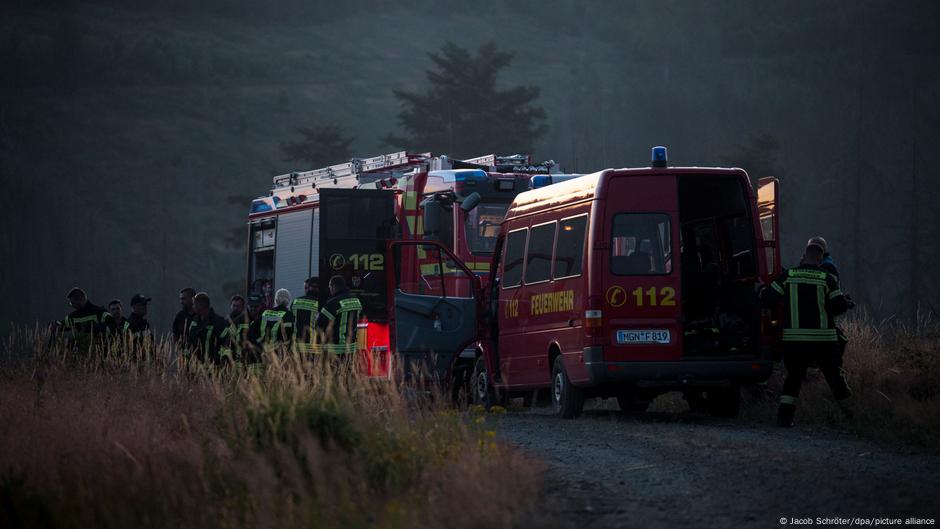
The checks come in response to stricter German controls at the shared border, which have been stepped up under Chancellor Friedrich Merz’s government after they were reintroduced in November 2023.
Meanwhile, raging wildfires in forested areas in Germany’s eastern states are reportedly under control after firefighters spent a tense weekend battling the blazes.
The state of Thuringia was particularly badly hit by what was described as its biggest wildfire in over three decades.
This blog has now closed. Find out what Germany was talking about on Monday, July 7, in our daily updates with a mix of news, analysis and background.
Skip next section Germany records more than 2,000 drug-related deaths in 202407/07/2025July 7, 2025
Zac Crellin
Experts have sounded the alarm after Germany recorded upwards of 2,000 deaths from illegal drug use for the second consecutive year.
A total of 2,137 drug deaths were recorded in 2024, federal drug commissioner Hendrik Streeck said on Monday.
Although the total is slightly down from 2,227 deaths recorded in 2023, authorities nevertheless recorded 14% year-on-year increase in drug-related deaths in under-30s.
Streeck said there was a sharp increase in deaths due to synthetic opioids like fentanyl or nitazene because of the Taliban’s ban on opium production in Afghanistan.
“We must react faster, more systematically and stronger to new, more dangerous drugs,” Streeck said.
Dirk Schäffer, drug policy officer at campaign group Deutsche Aidshilfe, said the increase in drug-related deaths was a “catastrophe.”
“We’ve seen a doubling in the last 10 or 12 years,” he told Germany’s DPA news agency.
To view this video please enable JavaScript, and consider upgrading to a web browser that supports HTML5 video
https://p.dw.com/p/4x5wRSkip next section German industrial output jumps, raising hopes of recovery07/07/2025July 7, 2025
The auto industry is at the core of Germany’s economic output Image: Martin Meissner/AP/picture alliance
German industrial production rose unexpectedly strong in May, lifting hopes that Europe’s largest economy may be turning a corner despite trade tensions with the US.
Production climbed 1.2% month-on-month after falling 1.6% in April, when US President Donald Trump announced sweeping tariffs, the federal statistics office Destatis said Monday.
Analysts polled by FactSet had expected a slight drop of 0.1%.
The rebound was driven by a surge in energy output and a 4.9% boost in the struggling automotive sector.
Overall, production was up 1% compared with May last year, adding to optimism after several positive production and orders reports since January.
ING analyst Carsten Brzeski said the data increased the chance that the recovery is about more than just customers placing orders early to avoid tariffs.
“It’s too early to give the all-clear, but signs of at least a cyclical rebound, albeit from low levels, are increasing”, he said.
https://p.dw.com/p/4x4a1Skip next section WATCH: Old German drivers — a risk on the streets?07/07/2025July 7, 2025
To view this video please enable JavaScript, and consider upgrading to a web browser that supports HTML5 video
https://p.dw.com/p/4x4a0Skip next section WATCH: Experiencing Germany by train — Euromaxx07/07/2025July 7, 2025
To view this video please enable JavaScript, and consider upgrading to a web browser that supports HTML5 video
https://p.dw.com/p/4x4ZzSkip next section German welfare organizations warn against proposed cuts to long-term care services07/07/2025July 7, 2025
A commission led by German Health Minister Nina Warken will begin work on Monday to find ways of stabilizing the long-term care insurance system in Germany as demographic changes put increasing pressure on its institutions.
According to federal auditors, nursing care insurance providers could face a shortfall of €12.3 billion (which those in need of care temporarily carry the costs themselves.
The commission, composed of representatives from the federal government and Germany’s 16 states, is to present its findings by the end of the year.
https://p.dw.com/p/4x40fSkip next section WTO: EU, Germany push for new world trade body 07/07/2025July 7, 2025
Thomas KohlmannThe World Trade Organization has been hamstrung for years by outdated rules and stalled reform efforts due to internal disagreementsImage: AP
Brussels and Berlin have launched a new initiative aimed at bypassing the long-standing paralysis of the World Trade Organization (WTO).
But how viable is such a solution?
DW looks into it here.
https://p.dw.com/p/4x4ZySkip next section German president remembers Nazi victims at Lithuania ceremony07/07/2025July 7, 2025
Richard Connor
German President Frank-Walter Steinmeier has commemorated the Lithuanian victims of the Nazis during World War II in a ceremony near the Baltic country’s capital Vilnius.
Steinmeier laid a wreath at the Paneriai Holocaust memorial. The event was also attended by Lithuanian Prime Minister Gintautas Paluckas.
Some 120,000 people were murdered by Nazis and local collaborators in the Paneriai forest during the German occupation of Lithuania between July 1941 and July 1944. At least 70,000 Jews were among them.
https://p.dw.com/p/4x4OuSkip next section Riders crash into crowd at major cycling race, injuring several — reports07/07/2025July 7, 2025
Two spectators at the German Track Cycling Championships in the western municipality of Dudenhofen were flown to hospital by helicopter on Sunday after two riders crashed into the crowd at high speed, German media have reported.
Eight other spectators were more lightly injured, and the two riders, who were traveling at about 60 kmh (37 mph) when they went over the safety barriers, escaped with just grazes and bruises, according to the reports.
The incident, which occurred during the elite keirin semi-finals, led to the remainder of the final day of competition being called off, Germany’s SWR broadcaster reported.
“The health of athletes and spectators always comes first,” German Cycling Federation (BDR) marketing and communications officer Oliver Streich said in a statement. “There was therefore no alternative to canceling the event.”
https://p.dw.com/p/4x3dDSkip next section Space capsule with ashes of 166 deceased plunges into Pacific07/07/2025July 7, 2025
A space capsule launched by a German start-up that was meant to carry the ashes of 166 people twice around the Earth before returning them to their loved ones has been lost in the Pacific Ocean after “an anomaly occurred” upon re-entry into the Earth’s atmosphere.
Citește mai multe știri pe top10stiri.ro
The Nyx capsule was launched on June 23 as part of an initiative called “Mission Possible” by The Exploration Company (TEC) in collaboration with the Texas-based company Celestis, which has specialized in space burials for more than two decades.
TEC said communication had been lost with the capsule shortly before it was due to splash down, with all remains of the deceased and some experimental items, including cannabis seeds, now scattered at an unknown location in the Pacific.
https://p.dw.com/p/4x3h7Skip next section DW’s Global Media Forum gets underway07/07/2025July 7, 2025
DW’s annual Global Media Forum (GMF), to which Germany’s international broadcaster has invited media professionals from across the globe, kicks off on Monday in the western city of Bonn.
The event, which runs for two days, has the motto this year of “Breaking barriers, building bridges.”
This year’s Freedom of Speech Award, a prize given annually by DW for outstanding work in promoting freedom of expression and human rights, will go to Tamar Kintsurashvili from Georgia.
Details on the GMF can be found in this article:
Global Media Forum 2025: Building bridges to beat populism
https://p.dw.com/p/4x3RsSkip next section Poland restores spot checks at German border in tit-for-tat move07/07/2025July 7, 2025
Polish guards check vehicles at the Slubice border crossing Image: Lisi Niesner/REUTERS
Authorities in Poland on Monday began carrying out random checks at 52 border crossings at the country’s border with Germany in a move contrary to the spirit of the visa-free Schengen zone.
The move comes in response to stricter German controls at the shared border, which have been stepped up under Chancellor Friedrich Merz’s government after they were reintroduced in November 2023.
The Polish border checks, which also apply to Poland’s border with Lithuania, are set to run initially until August 5.
Interior Minister Tomasz Siemoniak said Sunday the controls were meant only to combat “illegal immigration” and that Polish and other EU nationals would not face hindrances.
The controls will reportedly focus on buses, minibuses, cars carrying large numbers of passengers and vehicles with tinted windows.
EU rules on the Schengen area stipulate that countries are allowed to introduce temporary measures as a “last resort” and “in exceptional situations.”
Read the full story here
https://p.dw.com/p/4x3RrSkip next section Wildfire situation stabilizes in Germany’s east07/07/2025July 7, 2025
Firefighting aircraft were deployed to battle the blazes in ThuringiaImage: Daniel Vogl/dpa/picture alliance
Several wildfires in forested areas in Germany’s eastern states are reportedly under control after firefighters spent a tense weekend battling the blazes.
The state of Thuringia was particularly badly affected, with a fire in the Saalfeld-Rudolstadt district described as the state’s biggest wildfire in more than three decades.
“Our forces are exhausted,” said district administrator Marko Wolfram on Sunday, adding that he hoped emergency staff could be reduced from 500 on Sunday to 300 on Monday as the situation eased.
Hundreds of firefighters were also deployed between the states of Saxony and Brandenburg, where raging fires in the Gohrischheide region have burnt out large swathes of natural landscape.
The wildfires broke out as Germany, along with much of western Europe, was hit by the first major heat wave of the summer.
https://p.dw.com/p/4x3SsSkip next section Welcome to our coverage07/07/2025July 7, 2025
Timothy Jones | Elizabeth Schumacher Editor
A big Guten Morgen from the newsroom in Bonn as we start a new week.
Firefighters in the east of Germany, who have been battling major blazes all weekend, are feeling more optimistic as the weather cools following last week’s heat wave.
And DW is hosting the Global Media Forum in Bonn, an event bringing together journalists from across the world at a time when press freedom is under growing pressure even in countries once known as bastions of media liberty.
We will be keeping you up to date on these and other developments in our blog, as well as presenting in-depth analyses and explainers on topics related to Germany from our colleagues across DW’s departments.
https://p.dw.com/p/4x3X6Timothy Jones Writer, translator and editor with DW’s online news team.Richard Connor Reporting on stories from around the world, with a particular focus on Europe — especially Germany.Send us your feedback
Sursa: DW